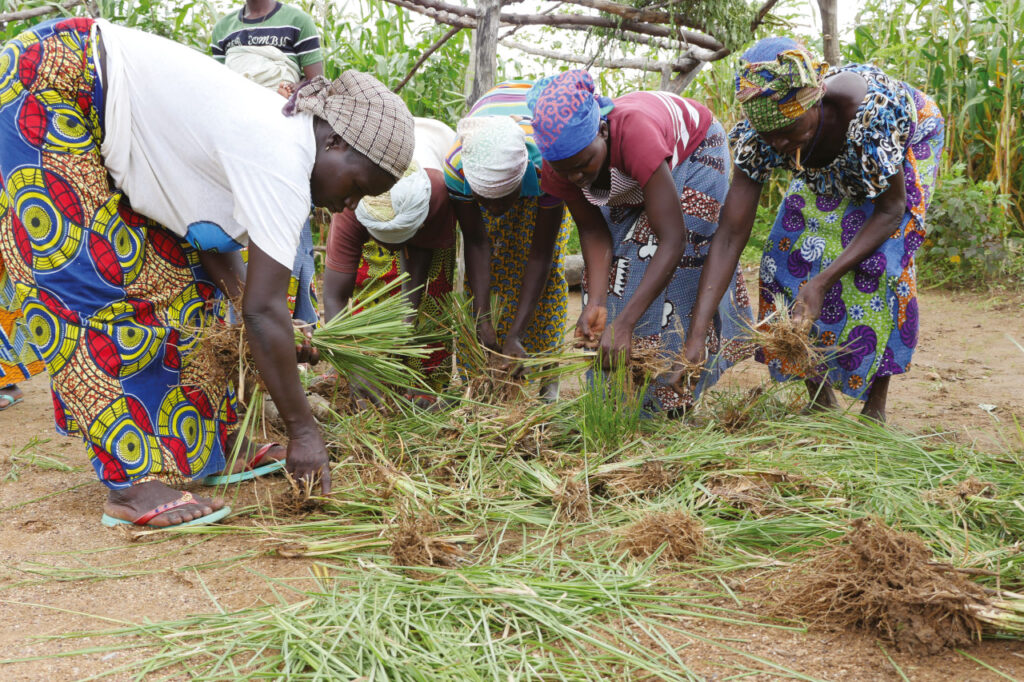[LUM#7] A world to feed
How can we ensure adequate food supplies for an ever-growing population while preserving the planet? This is a challenge we must tackle today to guarantee food security tomorrow.

Women dug up vetiver along the riverbank and then planted it along a stone embankment to reinforce it. © IRD – Tiphaine Chevallier
9.8 billion. That is the number of people who will populate our beautiful planet by 2050. This rapid population growth poses a real challenge: how can we feed an ever-increasing number of people? "The real challenge is not simply to feed them," explains Patrick Caron, a researcher at CIRAD, "but to ensure long-term food security." In other words, the ability to eat properly. "Food security encompasses the availability of food, access to it—in other words, the ability to produce or purchase one's own food—and the quality of food in terms of nutrition, health, sensory characteristics, and socio-cultural aspects. All of this must be ensured on a regular basis," explains the chair of the High Level Panel of Experts of the United Nations Committee on World Food Security (HLPE).
Triple burden
An ideal that is far from being achieved: food problems of various kinds affect the whole world. "We are facing a triple burden," says Patrick Caron. First, there is famine: 800 million people do not have enough to eat. "A situation exacerbated by climate change and conflict ," he points out (Agriculture and climate change: an inevitable marriage of convenience, in Agriculture and Climate Change, vol. 27, 2018). The second burden is that 2 billion people worldwide suffer from what is known as hidden hunger. "A deficiency in micronutrients—zinc, iron, iodine, vitamins A and B—which prevents good health." And finally, 2 billion people worldwide are overweight or obese, a condition that is associated with an increased risk of cardiovascular disease, high blood pressure, diabetes, and cancer.
How can we combat these scourges? In the20th century, the problem seemed simple: "The answer to the question 'how can we feed everyone?' was 'we need to produce more.'"The watchword at the time was intensification. Welcome to the "green revolution." "While this method of production did indeed keep pace with population growth, we now know that the intensive use of fertilizers and fossil fuels is not sustainable," the researcher points out. It is no longer simply a question of producing more, but above all of producing better. "Producing good quality food while preserving the environment and ensuring a decent income for farmers is the real challenge," explains Patrick Caron.
At the heart of sustainable development issues
This challenge places food security at the heart of sustainable development issues. "It's not just a question of producing enough, but rather of producing and consuming in a way that contributes to sustainable development." Environmental issues must be taken into account first and foremost. "In the 1990s, agriculture and the environment were sworn enemies, but then attempts were made to reconcile them," explains Patrick Caron. Preventing land degradation, maintaining biodiversity, and avoiding contributing to climate change are all challenges for an agricultural sector that still needs to be reinvented (Reconciling biodiversity conservation and food security: scientific challenges for a new agriculture, in Current Opinion in Environmental Sustainability, 2010). " Reconciliation is good, but it's not enough. We need to do better than that, using agriculture as a lever to safeguard the environment," explains Patrick Caron. For example? " In the field of livestock farming, the use of pasture has the advantage of sequestering carbon and thus limiting greenhouse gas emissions," illustrates the researcher.
Local solutions for global food security
"With agroecology, we are rediscovering that we can limit the use of chemical fertilizers and choose to imitate nature by stimulating its biological cycles," emphasizes Patrick Caron. And produce enough food to feed nearly 10 billion people? "Yes, but only if we implement local solutions that require significant design and engineering work," says Patrick Caron. "We will need to ensure consistency between these local transformations and global challenges."
Consume better
And for the planet to benefit, it is not enough to simply produce better. "It is also essential to consume better in order to contribute to sustainable development," insists Patrick Caron. This includes limiting losses and waste, which account for an average of 30% of food in most countries. But it also means consuming high-quality products that promote good health and limit public health costs. "In the case of overweight and obesity, the entire food environment is at fault, and all the factors that influence consumer choices must be taken into account," explains the expert.
"The issue of food security is like a Rubik's cube with so many facets to consider," explains Patrick Caron. The holy grail: "providing for everyone's needs according to their preferences and taking into account the social, environmental, and health impacts of what we consume." This goal requires redesigning the planet, with 10 billion people working together.
Find UM podcasts now available on your favorite platform (Spotify, Deezer, Apple Podcasts, Amazon Music, etc.).